大学英语精读unit 6-10教案
- 格式:doc
- 大小:145.00 KB
- 文档页数:15
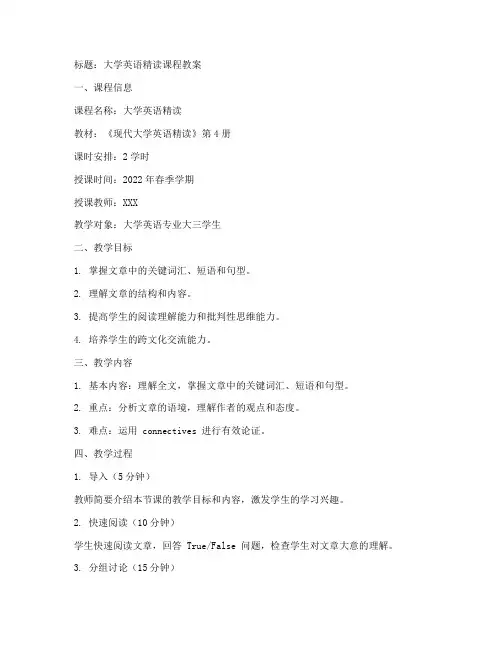
标题:大学英语精读课程教案一、课程信息课程名称:大学英语精读教材:《现代大学英语精读》第4册课时安排:2学时授课时间:2022年春季学期授课教师:XXX教学对象:大学英语专业大三学生二、教学目标1. 掌握文章中的关键词汇、短语和句型。
2. 理解文章的结构和内容。
3. 提高学生的阅读理解能力和批判性思维能力。
4. 培养学生的跨文化交流能力。
三、教学内容1. 基本内容:理解全文,掌握文章中的关键词汇、短语和句型。
2. 重点:分析文章的语境,理解作者的观点和态度。
3. 难点:运用 connectives 进行有效论证。
四、教学过程1. 导入(5分钟)教师简要介绍本节课的教学目标和内容,激发学生的学习兴趣。
2. 快速阅读(10分钟)学生快速阅读文章,回答 True/False 问题,检查学生对文章大意的理解。
3. 分组讨论(15分钟)学生分成小组,讨论文章中的关键词汇、短语和句型,分享学习心得。
4. 词汇讲解(15分钟)教师讲解文章中的关键词汇、短语和句型,引导学生运用所学知识进行分析。
5. 深入阅读(30分钟)学生深入阅读文章,分析文章的结构和内容,理解作者的观点和态度。
6. 小组展示(10分钟)各小组展示讨论成果,分享对文章的理解和感悟。
7. 课堂小结(5分钟)教师总结本节课的主要内容,强调重点和难点。
8. 作业布置(5分钟)教师布置作业,要求学生复习本节课的内容,并进行相关练习。
五、教学方法1. 讲授法:教师讲解文章中的关键词汇、短语和句型,引导学生进行分析。
2. 讨论法:学生分组讨论,分享学习心得,培养合作精神。
3. 案例分析法:教师提供实例,引导学生运用所学知识进行分析。
4. 小组展示法:学生分组展示讨论成果,提高表达能力和交流能力。
六、教学评价1. 课堂参与度:观察学生在课堂上的发言和讨论情况,评估学生的参与程度。
2. 作业完成情况:检查学生作业的完成质量,评估学生的学习效果。
3. 小组展示:评估学生在小组展示中的表现,包括表达能力、逻辑思维和团队合作能力。
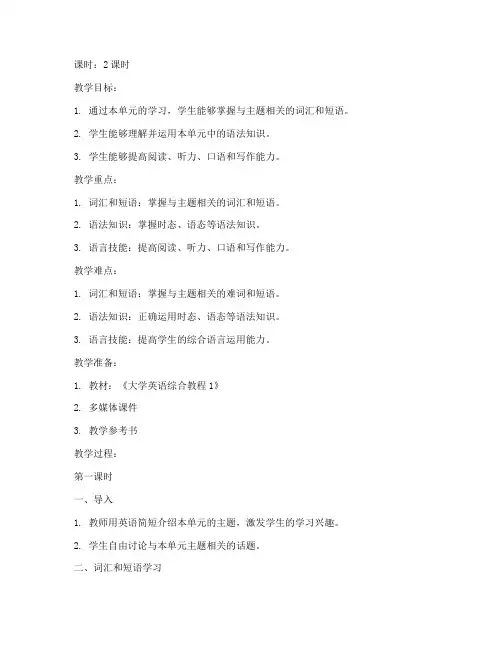
课时:2课时教学目标:1. 通过本单元的学习,学生能够掌握与主题相关的词汇和短语。
2. 学生能够理解并运用本单元中的语法知识。
3. 学生能够提高阅读、听力、口语和写作能力。
教学重点:1. 词汇和短语:掌握与主题相关的词汇和短语。
2. 语法知识:掌握时态、语态等语法知识。
3. 语言技能:提高阅读、听力、口语和写作能力。
教学难点:1. 词汇和短语:掌握与主题相关的难词和短语。
2. 语法知识:正确运用时态、语态等语法知识。
3. 语言技能:提高学生的综合语言运用能力。
教学准备:1. 教材:《大学英语综合教程1》2. 多媒体课件3. 教学参考书教学过程:第一课时一、导入1. 教师用英语简短介绍本单元的主题,激发学生的学习兴趣。
2. 学生自由讨论与本单元主题相关的话题。
二、词汇和短语学习1. 教师带领学生朗读并讲解本单元的词汇和短语。
2. 学生跟读,并尝试用所学词汇和短语进行造句。
三、语法知识讲解1. 教师讲解本单元的语法知识,如时态、语态等。
2. 学生跟读并练习运用所学语法知识。
四、阅读练习1. 教师指导学生阅读课文,并提出相关问题。
2. 学生回答问题,教师点评并纠正错误。
五、总结1. 教师对本节课的学习内容进行总结。
2. 学生复述本节课所学知识。
第二课时一、复习1. 教师提问,检查学生对上节课学习内容的掌握情况。
2. 学生回答问题,教师点评并纠正错误。
二、听力练习1. 教师播放听力材料,学生听后回答相关问题。
2. 教师点评并纠正错误。
三、口语练习1. 教师组织学生进行口语活动,如角色扮演、小组讨论等。
2. 学生积极参与,教师点评并纠正错误。
四、写作练习1. 教师布置写作任务,学生根据所学知识进行写作。
2. 教师点评学生作文,指出优点和不足。
五、总结1. 教师对本节课的学习内容进行总结。
2. 学生复述本节课所学知识。
教学反思:本节课通过多种教学活动,帮助学生掌握本单元的词汇、短语和语法知识,提高学生的阅读、听力、口语和写作能力。
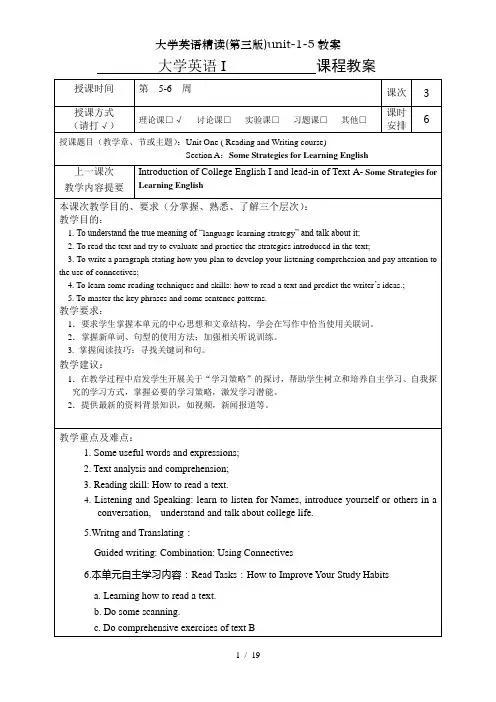
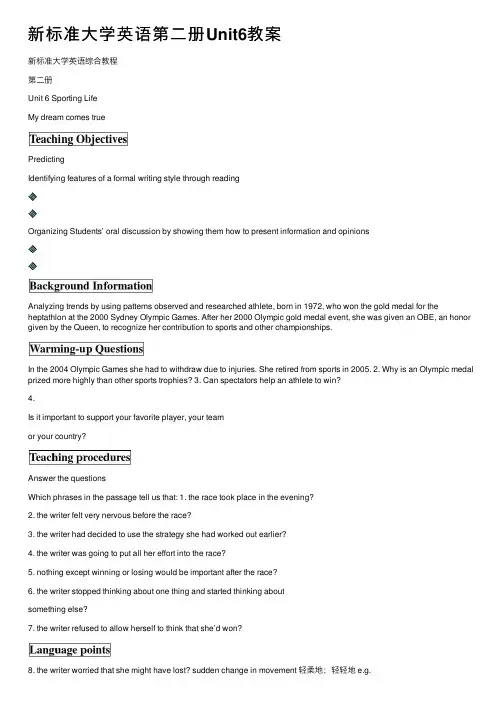
新标准⼤学英语第⼆册Unit6教案新标准⼤学英语综合教程第⼆册Unit 6 Sporting LifeMy dream comes truePredictingIdentifying features of a formal writing style through readingOrganizing Students’ oral discussion by showing them how to present information and opinionsAnalyzing trends by using patterns observed and researched athlete, born in 1972, who won the gold medal for the heptathlon at the 2000 Sydney Olympic Games. After her 2000 Olympic gold medal event, she was given an OBE, an honor given by the Queen, to recognize her contribution to sports and other championships.In the 2004 Olympic Games she had to withdraw due to injuries. She retired from sports in 2005. 2. Why is an Olympic medal prized more highly than other sports trophies? 3. Can spectators help an athlete to win?4.Is it important to support your favorite player, your teamor your country?Answer the questionsWhich phrases in the passage tell us that: 1. the race took place in the evening?2. the writer felt very nervous before the race?3. the writer had decided to use the strategy she had worked out earlier?4. the writer was going to put all her effort into the race?5. nothing except winning or losing would be important after the race?6. the writer stopped thinking about one thing and started thinking aboutsomething else?7. the writer refused to allow herself to think that she’d won?8. the writer worried that she might have lost? sudden change in movement 轻柔地;轻轻地 e.g.1. She kissed her baby gently on the cheek.她温柔地吻了吻她孩⼦的脸颊。
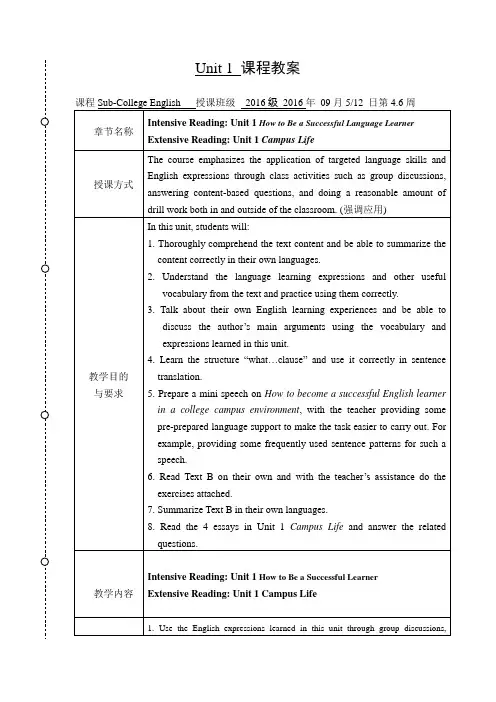
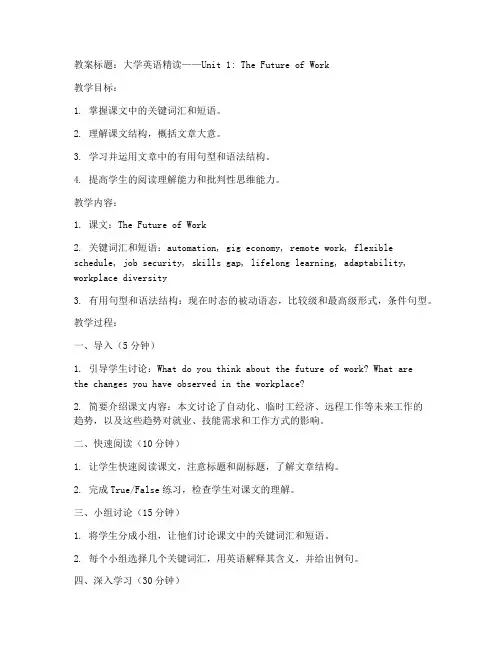
教案标题:大学英语精读——Unit 1: The Future of Work教学目标:1. 掌握课文中的关键词汇和短语。
2. 理解课文结构,概括文章大意。
3. 学习并运用文章中的有用句型和语法结构。
4. 提高学生的阅读理解能力和批判性思维能力。
教学内容:1. 课文:The Future of Work2. 关键词汇和短语:automation, gig economy, remote work, flexible schedule, job security, skills gap, lifelong learning, adaptability, workplace diversity3. 有用句型和语法结构:现在时态的被动语态,比较级和最高级形式,条件句型。
教学过程:一、导入(5分钟)1. 引导学生讨论:What do you think about the future of work? What arethe changes you have observed in the workplace?2. 简要介绍课文内容:本文讨论了自动化、临时工经济、远程工作等未来工作的趋势,以及这些趋势对就业、技能需求和工作方式的影响。
二、快速阅读(10分钟)1. 让学生快速阅读课文,注意标题和副标题,了解文章结构。
2. 完成True/False练习,检查学生对课文的理解。
三、小组讨论(15分钟)1. 将学生分成小组,让他们讨论课文中的关键词汇和短语。
2. 每个小组选择几个关键词汇,用英语解释其含义,并给出例句。
四、深入学习(30分钟)1. 讲解并练习课文中的有用句型和语法结构。
2. 让学生模仿课文中的句型,用他们自己的话表达对未来工作的看法。
五、阅读理解(20分钟)1. 让学生阅读课文,回答相关问题,检查他们的阅读理解能力。
2. 引导学生思考:课文中的观点是否合理?为什么?有哪些支持证据?六、总结和作业(10分钟)1. 让学生总结课文的主要观点,并分享他们的看法。
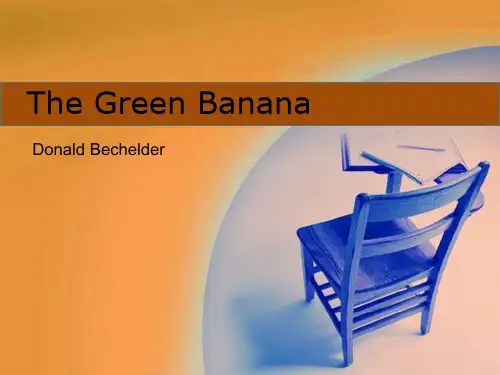
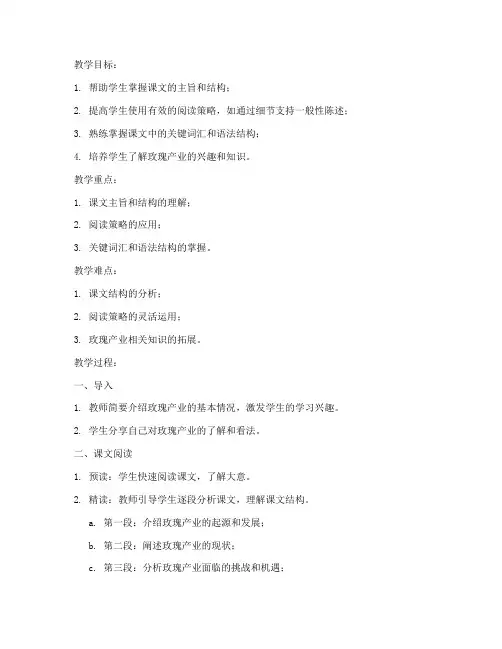
教学目标:1. 帮助学生掌握课文的主旨和结构;2. 提高学生使用有效的阅读策略,如通过细节支持一般性陈述;3. 熟练掌握课文中的关键词汇和语法结构;4. 培养学生了解玫瑰产业的兴趣和知识。
教学重点:1. 课文主旨和结构的理解;2. 阅读策略的应用;3. 关键词汇和语法结构的掌握。
教学难点:1. 课文结构的分析;2. 阅读策略的灵活运用;3. 玫瑰产业相关知识的拓展。
教学过程:一、导入1. 教师简要介绍玫瑰产业的基本情况,激发学生的学习兴趣。
2. 学生分享自己对玫瑰产业的了解和看法。
二、课文阅读1. 预读:学生快速阅读课文,了解大意。
2. 精读:教师引导学生逐段分析课文,理解课文结构。
a. 第一段:介绍玫瑰产业的起源和发展;b. 第二段:阐述玫瑰产业的现状;c. 第三段:分析玫瑰产业面临的挑战和机遇;d. 第四段:总结全文,提出建议。
三、阅读策略训练1. 教师讲解阅读策略,如通过细节支持一般性陈述;2. 学生练习使用阅读策略,分析课文中的细节,支持一般性陈述。
四、词汇和语法学习1. 教师讲解课文中的关键词汇和语法结构;2. 学生通过练习巩固所学知识。
五、课堂活动1. 小组讨论:学生分组讨论玫瑰产业的发展前景,并提出自己的观点;2. 演讲比赛:学生选取课文中的一个段落,进行演讲,展示自己的理解。
六、总结与作业1. 教师总结本节课的学习内容,强调重点和难点;2. 布置作业:学生撰写一篇关于玫瑰产业的短文,要求运用所学词汇和语法。
教学反思:1. 本节课通过导入、阅读、策略训练、词汇语法学习、课堂活动等环节,使学生掌握了课文的主旨和结构,提高了阅读策略的应用能力;2. 教师在教学中注重学生的主体地位,鼓励学生积极参与课堂活动,培养学生的合作意识和创新精神;3. 课后作业的布置有助于巩固学生的知识,提高学生的写作能力。
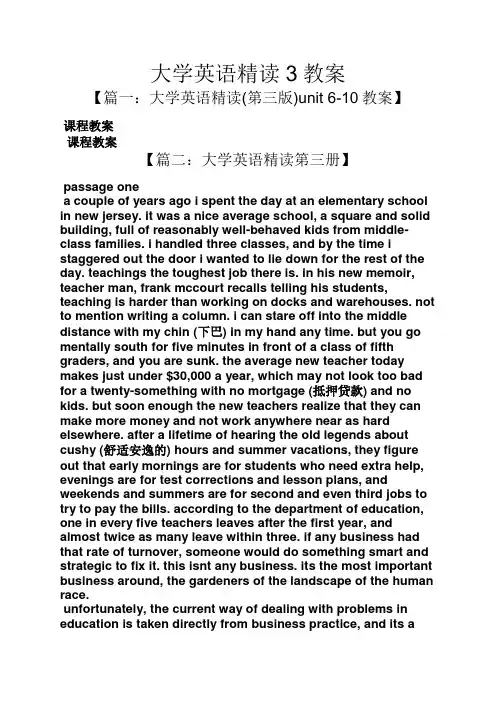
大学英语精读3教案【篇一:大学英语精读(第三版)unit 6-10教案】课程教案课程教案【篇二:大学英语精读第三册】passage onea couple of years ago i spent the day at an elementary school in new jersey. it was a nice average school, a square and solid building, full of reasonably well-behaved kids from middle-class families. i handled three classes, and by the time i staggered out the door i wanted to lie down for the rest of the day. teachings the toughest job there is. in his new memoir, teacher man, frank mccourt recalls telling his students, teaching is harder than working on docks and warehouses. not to mention writing a column. i can stare off into the middle distance with my chin (下巴) in my hand any time. but you go mentally south for five minutes in front of a class of fifth graders, and you are sunk. the average new teacher today makes just under $30,000 a year, which may not look too bad for a twenty-something with no mortgage (抵押贷款) and no kids. but soon enough the new teachers realize that they can make more money and not work anywhere near as hard elsewhere. after a lifetime of hearing the old legends about cushy (舒适安逸的) hours and summer vacations, they figure out that early mornings are for students who need extra help, evenings are for test corrections and lesson plans, and weekends and summers are for second and even third jobs to try to pay the bills. according to the department of education, one in every five teachers leaves after the first year, and almost twice as many leave within three. if any business had that rate of turnover, someone would do something smart and strategic to fix it. this isnt any business. its the most important business around, the gardeners of the landscape of the human race.unfortunately, the current way of dealing with problems in education is taken directly from business practice, and its aterrible fit. instead of simply acknowledging that starting salaries are woefully low and committing to increasing them and finding the money for reasonable recurring raises, politicians have wasted decades talking about something called merit pay (奖励工资). its a concept that works fine if youre making toys, but kids arent toys, and good teaching isnt an assembly line.26. what can we infer from the first paragraph about teachers? 1they have to teach three classes at a time.2they have a very rewarding job.3they prefer to teach children from middle-class families.4they have a very hard job to do.27. why does the author say teaching is tougher than writing a column? 1teaching is like working on docks and warehouses. 2teaching demands full attention.3teachers have to work with children.4teachers have no chance to go traveling.28. what do new teachers find out after some practice?1their starting salary is lower than offered by other occupations. 2they have to work during vacations to make ends meet.3they have to plan their time well to get everything done.4they can take a second or even a third job besides teaching.29. we can infer from the fourth paragraph that the author thinks __________. 1measures should be taken to keep teachers in their jobs2the rate of turnover in teaching is low compared to other occupations 3its natural for a number of teachers to quit in three to five years 4its fair to call teachers the gardeners of the landscape of the human race30. what does the author think of merit pay?1it will make up for teachers low starting salaries.2it will bring down the turnover rate of teachers.3it is a good fix for current educational problems. 4it is not suitable for the teaching profession.几年前,我花了一整天在新泽西的一所小学。
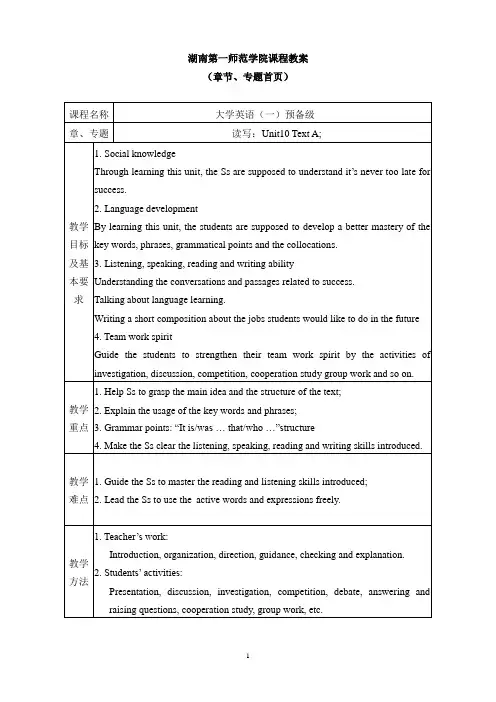

课程名称:现代大学英语精读3教学单元:Unit 6课时:2课时教学目标:1. 理解并掌握本单元的核心词汇和短语。
2. 理解文章的主旨大意,提高阅读理解能力。
3. 通过分析文章结构,培养学生的逻辑思维能力。
4. 学习并运用本单元的语法知识,提高英语写作能力。
教学重点:1. 词汇:掌握核心词汇和短语,如:arbitrary, consensus, prevalent, ubiquitous, etc.2. 语法:学习并列句和复合句的用法,提高句子结构表达能力。
教学难点:1. 理解文章中复杂句子的结构。
2. 运用本单元所学词汇和语法知识进行写作。
教学过程:第一课时一、导入1. 复习上一单元所学内容,检查学生对词汇和语法知识的掌握情况。
2. 介绍本单元的主题:Globalization and Its Impact on the World。
二、阅读理解1. 学生自主阅读课文,完成课后练习题。
2. 教师讲解课后练习题中的难点,帮助学生理解文章内容。
3. 分组讨论,讨论文章的主题和观点。
三、词汇讲解1. 教师带领学生分析本单元的核心词汇和短语,如:arbitrary, consensus, prevalent, ubiquitous, etc.2. 通过例句讲解词汇的用法,帮助学生记忆和运用。
四、语法讲解1. 介绍并列句和复合句的用法,结合例句进行讲解。
2. 学生练习句子结构,运用所学语法知识进行写作。
五、总结1. 回顾本节课所学内容,强调重点和难点。
2. 布置课后作业,要求学生复习巩固所学知识。
第二课时一、复习1. 学生回顾上一节课所学内容,检查自己对词汇和语法的掌握情况。
2. 教师针对学生存在的问题进行讲解和辅导。
二、阅读理解1. 学生阅读课文,完成课后练习题。
2. 教师讲解课后练习题中的难点,帮助学生理解文章内容。
三、写作练习1. 教师布置写作任务,要求学生运用本单元所学词汇和语法知识进行写作。
2. 学生完成写作任务,教师批改并给予反馈。
教学目标:1. 让学生掌握本单元的核心词汇和短语。
2. 提高学生的阅读理解能力,培养学生对文章主旨和大意的把握。
3. 培养学生的批判性思维和表达能力,让学生学会对文章内容进行归纳和分析。
4. 培养学生的文化素养,了解相关背景知识。
教学内容:1. 本单元核心词汇和短语:anxiety, depression, therapy, stress, relaxation, meditation, etc.2. 阅读理解:掌握文章主旨和大意,分析文章结构和段落关系。
3. 批判性思维和表达能力:学会对文章内容进行归纳和分析,撰写小论文。
教学过程:一、导入1. 介绍本单元主题:心理健康与压力管理。
2. 引导学生思考:在现代社会中,心理健康和压力管理对我们的生活有何重要性?二、词汇教学1. 教师带领学生学习本单元核心词汇和短语,如anxiety, depression, therapy, stress, relaxation, meditation等。
2. 通过例句讲解词汇用法,帮助学生理解和记忆。
3. 学生分组进行词汇接龙游戏,巩固所学词汇。
三、阅读理解1. 学生自主阅读课文,了解文章主旨和大意。
2. 教师引导学生分析文章结构和段落关系,讲解文章的论证方法。
3. 学生分组讨论文章中的关键信息和观点,分享自己的理解和感悟。
四、批判性思维和表达能力1. 教师提出问题,引导学生对文章内容进行归纳和分析。
2. 学生撰写小论文,阐述自己的观点和见解。
3. 教师对学生的论文进行点评,指出优点和不足。
五、课堂小结1. 回顾本节课所学内容,总结核心词汇和短语。
2. 强调心理健康和压力管理的重要性。
3. 布置课后作业,要求学生阅读相关资料,提高自己的心理健康意识。
教学反思:1. 本节课通过词汇教学、阅读理解和批判性思维训练,提高了学生的英语综合运用能力。
2. 教师应关注学生的个体差异,因材施教,激发学生的学习兴趣。
3. 在今后的教学中,应注重培养学生的文化素养,拓宽学生的视野。
大学英语精读第三版第二册U6教案Unit 6 The Making of a SurgeonTeaching Time: 8 hoursStudents’ level: non-English majors of the second semester of the 1 st year.Teaching Objectives:1.Understand the growing process of a surgeon from a beginner to a veteran, from being lack of experience to being full of self-confidence. Ensure that students have an idea about self-confidence, critical decision, attitudes toward mistakes, doctor’s growing and professional ethic.2.About the text, Ss should grasp the text content, text structure, basic vocabularies and the required grammar points of the section.Words: anticipate, avoid, bother, bound case, conceited, conclude, confident, constant, critical, dwell, emergency, handle, resolve, responsibilitiesPhrases & Expressions: draw to a close, live with, dwell on, bound to, in practice, butterflies in the stomach, open up, in advance, atone time or another, sit onGrammar: using conjunction of once, sentences expressing logical order , emphatic expression3.About the reading, Ss should acquire the reading skill —reading for the implied meaning.4.About the writing, Ss should get to know the paragraph developing —parallelism.5.About the listening, Ss will finish Unit 6 directed by theteacher. Teaching Procedures:I.Pre-reading Activities1.Introductory remarks:It goes without saying that everyone wants to become successful. But usually there is a long way to go before one can gain success. This is especially true of a surgeon. What's the key to the making of a surgeon and at what point in time does a doctor finally become a surgeon? In this text, the author, a famous surgeon, tells us the answer from his own experience. Now let's have a careful study of the text.2.Warm-up questions(1) What qualities do you think are essential to a surgeon?(2) What kind of doctor do you like most?(3) Do you want to work as a surgeon? Why or why not?3.Key words and expressions:1). conclude:a. arrive at a belief or opinion by reasoning: for example:The doctor concluded that the patient's disease was cancer.The judge concluded that the accused was guilty.b. come or bring to an end: for example:The professor concluded his lecture by summing up the main points hehad previously mentioned.c. arrange; bring about: for example:The two countries concluded a peace treaty.2). competent:properly or sufficiently qualified; capable; adequate for the purpose:be competent in one’s work/as a teacher/to do his job.3)particular:a.belonging to some person, thing, or occasion; single and different from others. For example:She has a particular preference for Chinese art.He wasn't watching us at all at that particular moment.b.special; unusual. For example:Particular attention was given to the orphan girl.The particular nature of his job keeps James Bond on guard all the time.c.hard to satisfy. For example:I’m not particular about my clothes; I don't mind what I wear.He is very particular about his food.d.detailed; exactE.g. Give me a full and particular description of what happened.4). constant:a. happening all the time. For example:Headache is her constant complaint.b. remaining the same. For example:Temperature is at a constant 26 degrees in this hotel.c. faithful. For example:He alone remains constant to the quick-tempered musician.5). resolve:a. solve. For example:The dispute was resolved through mediation.To the amazement of all, the little boy resolved the equation in five minutes.b. decide. For example:He resolved that nothing would hold him back.The Party resolved to pay more attention to economicdevelopment.c. (n.) sth. that has been decided, decisionE.g. On New Year's Day, he made a resolve to go jogging twice a week.6). sound:a. correct; based on good judgment. For example:You can depend on her for a sound judgment\choice..b. healthy; in good condition. For example:I doubt if he is sound in his mind.Her heart is as sound as a drum.7). handle:a. manage; deal with. For example:A manager must know how to handle his men.b. touch; take up. For example;The stamp collector washes his hand before handling stamps.c. operate; direct; train. For example:After two months5 training, the worker now handles the machine with ease.d. part of a tool, cup, bucket, door, drawer, etc. by which it may be held in the hand. For example:the handlebar of a bicycle; the handle of a cup; a door handle.Hold the handlebar of a bike tightly, you won't fall down.8)anticipate:a)see beforehand. Examples:Analysts are anticipating a bull market.I anticipate having an enjoyable working relationship with you all.A good teacher should anticipate what the students need.b) expectE.g. I anticipate his arrival with much pleasure.9)sole:one and only; unshared. For example:Drunken driving was the sole cause of the accident.His sole wish is to live an undisturbed life.!0) avoid:escape; keep or get away from. For example:For fear of kidnappers, parents tell their children to avoid speaking to strangers in the street.11) bother:a. annoy; trouble. For exampleI am sorry for bothering you with so many questions.b. worry. For example:There’ ll be some way out. Don’t bother about it.c. worry; trouble. For example:What a lot of bother about nothing!12.making :n. a) the process of a person or thing that makesE.g. The making of the English language is an interesting subject.b) the means or cause of success or great improvement or advancementE.g. Hard work will be the making of you.13. surgeon :n. a) doctorE.g. Many lives have been saved by this famous surgeon.b) surgery : (n.) operationE.g. Cancer usually requires surgery.c) surgical : (adj)E.g. A surgeon always wears a surgical mask in the operation room.14. critical :a. a) important at a time of danger and difficultyE.g. Heroes emerge at critical moment in history.b) fault-findingE.g. He has written several critical articles on the film.15. case :n. a) instance of disease or injuryE.g. Emergency cases must be treated first.b) actual state of affairs, instance of the occurrence of sth.E.g. Suffering can have beneficial results and certainly I know that was true in my case.c) question to be decided in a law courtE.g. The case is still under police investigation.16. draw to a close / an end :come to an end; concludeE.g. The summer vacation in drawing to a close.17. live with :accept ( sth unpleasant )E.g. You must live with the fact that you are no longer as healthy as you are.18. dwell on / upon :think about , speak or write a lot aboutE.g. It doesn't do to dwell too much on one's shortcomings.19.be bound to :be certain toE.g. Look at the cloudless sky ! It is bound to clear up.20. butterflies on one's stomach :a feeling of fear or anxiousE.g. When her turn for the oral test came, she suddenly had butterflies in her stomach.21. in advance :before or ahead of timeE.g. There's always a great demand for tickets, you'd better book your seats well in advance.22. sit on :do nothing about, neglectE.g. It's unfortunate that our director simply sat on our suggestion and did nothing about it.4. Synonym Discrimination1). treat curetreat : To accept as a patient, to diagnose illness and to help relieve it cure : to bring back to health, stressing the positive result of medicaltreatmentE.g. The bone fracture in the truck driver's left leg was being carefully treated.Doctors and scientists may discover at any moment now how to cure cancer.2). encounter meetencounter : more formal word; strongly to imply a casual or unexpected meeting.meet : common word. to see peopleE.g. He encountered many difficulties an his journey around the world.He promised to meet her at the airport.Ⅱ. While-reading Activities1.Ss have the silent reading on the text (10 mins)2.T explains the text in detail.Lines 1-- 71. Language PointsThere is no surgical patient I cannot treat competently, treat just as well as or better than any other surgeon…(1) "I cannot …any other surgeon" is attributive clause, modifying "surgical patient".(2) The double negative sentence has a strong meaning.E.g. There is nothing that he cannot do.2. Questions for Discussion(1) Do you think self-confidence is essential to a surgeon?---Self-confidence is considered a symbol of competence, which can reassure patients and help a surgeon make resolute decisions and take resolute actions to help his patients.(2) Why is the double negative sentence "There is no surgical patient I cannot treat competently" used?---To emphasize the affirmation and show confidence.Lines 8--161. Language PointsIt was the only way I could find the peace of mind I needed to relax. (1) "It was the only way" is the main sentence.. "I could…to relax" is attributive clause, modifying "way". And in this attributive clause , "I needed to relax" is attributive clause, modifying " the peace of mind.2. Questions for Discussion(1)What people would make a telephone call at night to the hospital?---Those who are seriously injured in an accident, seriously ill for some sudden reasons.(2) How do you understand a " critical decision"?---A critical decision is a life-and-death decision because it can save a patience's life or result in a patience' death.(3) What can you conclude about the resident from thisparagraph?---He worried about the decisions he made and he had a strong sense of responsibility.Lines 17--241. Language Points…but I had learned to accept this a constant problem for a surgeon, one that…live with it.(1) accept…as : I accepted him as my dear brother.(2) "One " refers to "a problem". "It" refers to "situation".2. Questions for Discussion(1) How do you understand "I could live with it"?---He could face the decisions he made, right or not, with peace of mind.(2) Why did he have a nice feeling?---He had gained enough knowledge and experience and he had self-confidence.Lines 25--321. Language PointsI'd sweated through my share of stab wounds of belly, of punctured lungs, or compound fractures. = I'd been nervous and filled with anxiety while painstakingly treating the serious injuries that come to every young doctors, such serous injuries as stab wounds in the belly,punctured lungs and compound fracture.(1) sweat : work long and hardE.g. The team sweated through the game and managed to keep their trophy.(2) share : a partE.g. That is your fair share.2. Questions for Discussion(1) Why did he mention these three cases?--- They were all serious injuries and complicated cases in which it was impossible to anticipate all the problems in advance.(2) When and why didn't he "sweat" through the operations any more? ---When his five-year residency was drawing to a close. He was no longer nervous because he had gained the knowledge, the skill, the experience and confidence.Lines 33--411. Language Pointswhen I was out in practice = when I completed my residency period and began to work on my own as a surgeon.…chances were that no other surgeon could have, either…= …it was most likely that other surgeon could have avoided the same mistakes.(1) chances are / were that : it is / was likely thatE.g. Chances are that he has already heard the news.2 Questions for Discussion(1) What kind of mistakes could a surgeon make?---He could make a wrong judgement, operate on a wrong person or wrong parts, etc.(2) What was his attitude toward hid mistakes before the residency?---He couldn't tolerate or forgive them; he couldn't bear to think he was solely responsible for them.(3) Are you afraid of making mistakes?---Mistakes are part of human's life, no one could avoid them. And failure is the mother of success. We could learn lessons from our mistakes. Lines 42--471. Language PointsHe needs it to encourage him in trying moment.(1) trying : distressing. difficultE.g. We had a trying day.(2) try : cause to be tired, exhausted, out of patience, etc.E.g. Time tries everything.2. Questions for Discussion(1) Why does the author use "sounds" and "guess" when he speaks of "conceit"?---Conceit means excessive pride in oneself or in one's abilities. It is not usually a good characteristic or behavior. But to some extent, a surgeonneeds it.(2) What is it that a surgeon needs, conceit or self-confidence?---Both. Self-confidence means adequate confidence in oneself and one's abilities. It's based on competence, experience and the like. Conceit , the feeling that one is better that others, is what a surgeon needs to help give self-confidence.Paragraph One and Two:1). Language Points:a. draw to a close: come to an end. Examples:This semester is drawing to a close.The year soon drew to its close.b. on more than one occasion: more than one time. For example:I have asked him for my books on more than one time.On another occasion, he landed in a deserted car park.c. treat, cure: To treat someone medically is to accept him as a patient, to diagnose his illness and to help relieve it. To cure someone (of an illness), on the other hand, is to bring him back to health, stressing the positive result of medical treatment. We can also s ay ‘to cure a disease’meaning ‘to get rid ofdisease’. Compare the following examples: Which doctors are treating her for her illness?This medicine should cure you of your cold.2) Questions:a. Why did he ask the question when he was finishing his residency?b.do you think self-confidence is essential to a surgeon?Paragraph Three:1). Language Points:a. encounter, meet:Encounter is a synonym for meet. It is a more formal word and strongly implies a casual or unexpected meeting.Compare the following examples:He promised to meet her at the airport.On the train I encountered (or : chanced to meet) an old friend of mine who I had not seen for years.b. having trouble doing sth.: have difficulty doing sth. Examples:Such a pleasant girl as she has no trouble making friends with people. The boy had a lot of trouble getting up early in winter.2). Questions:a. How do you understand a “critical decision”?b. What can you conclude about the resident from this paragraph? Paragraph four:1). Language Points:a. live with: accept (sth. unpleasant). Examples:Most of us don^t like the new regulations, but we have to learn to livewith them. You must live with the fact that you are no longeras healthy as you were.b. dwell on : think about; speak or write a lot about. Examples:Let bygones he bygones. Don’t dwell so much on the past.The speaker dwelt on that point for more than an hour.c. be bound to : be certain to ; be sure to. Examples:You are bound to succeed if you keep on trying.If s hound to rain. Look! The clouds are gathering quickly.2). Questions:a. What does the author mean by "sleeping was no longer a problem^?b. Why did he have a nice feeling?Paragraph Five:1). Language Points:a. in practice: while performing my professional skills as a surgeo n. "Practice”here means "exercising or performing the profession of medicine”' i.e., “regular work of a doctor”.b. butterflies in one’s stomach: a feeling of fear or anxiety. Examples: When the young man walked into the office to see headmaster, he had butterflies in his stomach.Whenever he gets up in front of his audience, he has butterflies in his stomach, no matter how many times he does it.c. in advance: ahead of time; beforehand. Examples:You have to pay the rent in advance.e.I’d sweated through my share of stab wounds of the belly, of punctured lungs, or compound fractures.: Yd been nervous and filled with anxiety while painstakingly treating the serious injuries that come to every young doctor ——such serious injuries as stab wounds in the abdomen, punctured lungs and compound fractures.2). Questions:a. Why did he mention these three cases?b. When and why didn’t he “sweat”through the operations any more? Paragraph Six:1). Language Points:a. "Nor was I afraid of making mistakes”Inversion shoul d be applied when a negative word is placed at the beginning of a sentence. More examples:Never have I seen such an unreasonable person as him.Seldom does he speak Chinese in English classes.b. When I was out in practice : When I completed my residency period and began to work on my own as a surgeon.c. sit on: neglect; do nothing about. Examples:I sent in my application in good time, but the secretary sat on it for a month.We should not sit on those who need help.d. ... chances were that no other surgeon could have, either.: it was most likely that no other surgeon could have avoided the same mistake, chances are/were that: it is/was likely that. For example:Chances are that our team will win.2). Questions:a. What kind of mistakes could a surgeon make?b. Are mistakes part of human's life?Paragraph Seven:1). Language Points:a. conceited: foil of pride in one's powers, abilities, etc. Examples:The conceited actor behaved as if he were the greatest man in the world. The conceited rabbit was beaten by the turtle intheir race.b. trying moments: moments that cause severe strain; moments that try one's nerves. For example:I always ask my father for help in trying moments.2). Questions:a. Why does the author use “sounds”and “guess”when he speaks o f “conceit”?b. What is it that a surgeon needs, conceit or self-confidence?3. T asks Ss to come out the main idea, structure of the text (10 mins)4. T summarizes the main idea and structure of the text (5 mins)Ⅲ. Summary Questions and Concluding Remark s1. Summary Questions(1) What's the making of a surgeon?---It's a long and tough way. Not until he finishes the medical education and the hospital residency. Not until he builds up necessary confidence in himself.(2) What had the author gone through before he became a surgeon?---Emergency situations he encountered at night; the critical decisions he had had to make; the sleepless nights because of worries about his treatment; the experience of sweating through operations; the fear of making mistakes and the transition from doubts and uncertainties to self-confidence.2. Concluding Remarks---Self-confidence is the key to the making of a surgeon. But self-confidence is based on necessary knowledge, skills, experience and expertise. In addition , the sense of responsibility is another quality foe s qualified doctor. All these work ethics arerequired for professionals in various other fields as well.Ⅳ. Post-reading Activities1.Let the students do the exercises in the textbook which arc related to the new words.2.Ss hand in the summary of the text.3.Ss discuss the questions on the topic related to the text.。
大学英语精读第三版(上海外语教育出版社董亚芬主编)第一册Book1 Unit6答案1) expert2) amaze3) quality control4) relieve5) assembly line6) fire7) major8) decrease9) management10) productive1) relieve2) decrease3) whatsoever4) career5) Unfortunately6) results in7) background8) As a result9) recognized10) hold up keep up with11) furthermore12) on a basis13) boring14) findings15)talk over16) productive1) are the basis for any good relationship between nations2) is the great efficiency of the public services3) was held up by a thick fog over the airport4) two major earthquakes in its history, one in 1906 and the other in 19895) the professor was often absent-minded in his personal life6) result in an employee's being fired1) impossible2) aware3) unfortunate4) literate5) unnecessary6) frequent7) impatient8) adequate9) unsealed10) finished11) unfair12) likely13) irregular14) direct1) management2) managed3) inspected4) inspection5) would consult6) consultation7) bore8) Bored9) assembled10) assembling1) especially/specially2) especially3) specially4) especially5) specially6) especially/specially1) They spent two whole months working on the design of the machine.2) The artist spends most of his spare time collecting butterfly specimens.3) The manager spent three hours talking to Sam yesterday morning.4) He spent the whole morning trying to solve the math problem.1) except2) except for3) except4) except for5) except6) except for1) His nephew didn't use to visit him at Christmas.Did his nephew use to visit him at Christmas?2) He didn't use to be as thin as she.Did he use to be as thin as she?3) She didn't use to burn the midnight oil.Did she use to burn the midnight oil?1) didn't they2) did't you3) wasn't there1) First of all/Most important of all2) Most curious of all3) Most important of all4) Worst of all1) efficiency2) Furthermore3) amazing4) observation5) foundation6) career7) reorganize8) assembly9) findings10) management11) suggestions12) productive13) background14) relieving15) holding up16) Unfortunately1)places/roles2)bored3)enjoy/like4)traveling/going5)hour6)the7)in8)telling/ordering9)didn’t10)until11)job12)mine13)take/accept14)stay15)at16)being17)understand18)so19)boring/dull20)work21)an22)until23)on24)right/correct25)so26)what27)problems1) took out2) searched3) assistant4) make a list5) correct6) articles7) lying8) satisfied9) pulled out10) Embarrassed翻译1) 据报道,那条铁路曾因洪水而停止修建。
现代大学英语精读教案集团标准化办公室:[VV986T-J682P28-JP266L8-68PNN]U n i t1H a l f a d a y教学目的 1. 了解作者及其背景知识;2.熟悉本文使用的写作手法;3.掌握修辞疑问句、倒装句等修辞手法;4.熟练掌握三类构词法;5.通过深刻理解文章内涵,培养学生社会洞察力和相关的讨论能力,同时掌握文中的核心语言点。
教学内容1. 热身2.作者教育与背景主要着作创作观3.作品赏析结构分析如何赏析文学作品扩展式讨论4.写作技巧省略疑问句和修辞疑问句倒装句“with”独立结构5.语言理解长难句解析核心词汇学习band, convince, daze, exert, intricate, observe, overlook, rank, revolve, startle, uviverse, vary介词练习构词法:-tion; -volve; -ly6.课堂讨论7.练与讲教学重点 1. 文学作品的赏析;2.文学中的修辞手法――省略疑问句和修辞疑问句;倒装句;“with”独立结构3.构词法:前缀教学方法结合实际吸收各种教学法(讲授、问答、讨论、模仿、练习、多媒体使用)的优点。
教学手段用投影仪播放PowerPoint课件及板书;群发电子邮件布置课堂资料和课后作业(或其来源)。
ⅠAbout the author★ Naguib Mahfouz was born on the 11th Dec. 1911 in an old quarter of Cairo, the youngest son of a merchant. (mummies and pyramids / sphinx 狮身人面)★ He worked in university administration(行政部门) and then in 1939 he worked for the Ministry of Islamic Affairs.( Buddhism Christianity Islam)★ He was later Head of the State Cinema Organization at the Ministry of Culture(文化部). He also worked as a journalist(记者).★ He is married, has two daughters and lives in Cairo.★ He was the first Arab to win the Nobel prize for literatureHe is now the author of no fewer than 30 novels, more than 100 short stories, and more than 200 articles. Half of his novels have been made into films which have circulated (流通;传播)throughout the Arabic-speaking world.The Cairo Trilogy(三部曲) is a tale of the lives of a Muslim family and spans(跨过) the first half of the 20th century.Palace Walk 《宫间街》Palace of Desire 《思官街》Sugar Street 《甘露街》How does he picture the world?1 The world is very gloomy(阴沉的令人沮丧的) though not completely disappointing.2 The author’s social utopia (乌托邦)is far from being realized.3 Time is the bringer of change and change is a very painful process.4 Life is a tragedy.ⅡText Appreciation1 structure2 Further discussionCan you recall your first day’s experience at primary school?Did you feel you were a stranger the first day you arrived at this university?Was it hard for you to leave home for the first time in your life What do you think is the business of university What do you expect to learn here3 Theme of the storyThe following are a few possible understandings of the message the story conveys. Which one do you agree with Argue with your group partners.Time and tide wait for no man.Life is a tragedy. There is nothing permanent in life but change.Education can never keep up with changes in society.Life is short and time is precious.Life is a dream. Do not take anything seriously.4 Structure of the textPart 1 (para. 1- 7 ) about:The boy’s misgivings about schoolPart 2 (para. 8-16 ) about: How the boy felt about school.Part 3 (para. 17-20 ) about: Walking out of the school, he found time had changed everything.5 Vocabularyband Word Formation bandage (n.)brand(adj.)Band of Brothersconvince Word Formation:convinced (adj.) convincing (adj.) convince sb of sth/thatI could not ~ him of his mistake.I am convinced of his honesty.一个令人信服的论点daze Word Formation dazzle (v.) dazzling (adj.)feel dazed (adj).习惯用语 in a daze (n) 茫然, 恍惚; 眼花缭乱dazzling sunshineexert Word Formation exertion (n.)exert on/upon 发挥;运用exert pressure on sbexert all one’s strength/influence to do sthexert oneself: make an effortexert oneself to arrive earlyintricate complex complicated sophisticatedobserve Word Formation observant (adj.) observatory (n.)overlook Word Formation over- : (prefix.)above; too;–overall overbusy overcome– overconfident overdraft6 Language Points1. I walked alongside my father, clutching his right hand. (para.1)alongside: side by side; next toclutching: present participle as adverbial modifierlist other examples from the text:2. They did not make me happy, however, as this was the day I was to be thrown into school for the first time. (para.1)What does “they” refer to?What does “to be thrown into” imply?3. My mother stood at the window watching our progress, and I turned towards her from time to time, hoping she would help. (para.2) Progress: slow and difficult movements toward schoolwhat do you know about the author’s relationship with hisparents?4. a street lined with gardens …(para.2)past participle phrase used here to modify “a street”.eg.a novel (that was) written by Charles Dickenspersonal computers (that are) made in China5. “Why school” I asked my father. “What have I done” (para. 3)elliptical questionrhetorical question“Why do I have to go to schoolI don’t think I’ve done anything wrong to be punished like this.”Eg:Rachel: Want a wedding dressMonica: What for?6.para.4 make… out of苹果汁是用苹果榨出来的。